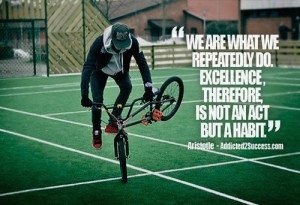Life
3 Lessons Cycling Has Taught Me About Being An Entrepreneur

I’ve been an athlete for just about as long as I can remember. While I spent most of my youth competing in one sport or another and my early adulthood staying fit in the gym, I never expected these disciplines to inform the career and business I would build later in life.
That all changed when a hunger for competition drove me to take part in a triathlon, which involves swimming, cycling, and running.
As my passion grew, particularly for cycling, I realized that the traits needed to be a successful cyclist are beneficial for entrepreneurs, too.
Biking Toward Better Entrepreneurship
Studies have shown that exercise can play a huge role in clearing your mind and helping you function better in general.
Stepping away from work to focus on a hobby can give you a new vantage point from which to find perspective, allowing the opportunity for innovation.
It also gives you the chance to meet new people. After all, you never know where you might encounter your next client, partner, or connection.
In addition to these more tangible benefits, a hobby such as cycling can teach you valuable lessons and have a direct influence on your performance in business.
1. Consistency is key
When I became a triathlete, I wanted to be the best right away, but I quickly discovered that it doesn’t happen overnight.
Achieving greatness takes years of consistent training, and you can only attain sufficient performance gains by maintaining focus over the long term.
This is equally true in business.
Everyone has a million-dollar idea, but the difference between those who succeed and those who fail boils down to who has the drive to put in consistent effort.
When you learn to celebrate the small victories and enjoy the journey, success is just a matter of patience.
“It’s not what we do once in a while that shapes our lives. It’s what we do consistently.” – Anthony Robbins
2. Be willing to struggle
After a few years of consistent training for triathlons, I reached a fairly competitive level, and a friend of mine whose performance was lacking decided to ask me for some training advice.
I sat down with him to review what he was doing.
Much to my surprise, I found out that he did a lot of low-intensity workouts.
When I asked him about his more challenging interval workouts, which are essential for effective training, he told me that he didn’t like doing them because they were “too hard.”
It didn’t take a rocket scientist to figure out why he was getting nowhere.
Most new entrepreneurs have no idea what they’re getting into, and they jump in thinking about the end goal, achieving success.
What they don’t expect are all of the challenges they’ll have to overcome.
Just because you’re struggling, it doesn’t mean you’re failing. In fact, the willingness to face a challenge head-on will determine whether you fail or succeed.
Like training on a bike, the biggest gains come when you’re willing to embrace the struggle.
3. Starting is half the battle
Over the years, I’ve tried a variety of triathlon training plans in an attempt to find the best one.
I’ve spent hours upon hours reading books, consulting with coaches, and even contacting some of the sport’s top professionals.
But after all of that research and effort, I’ve learned that nothing happens unless you just get on your bike and go.
Sometimes, athletes obsess over training plans so much that they never get to the actual training.

Early in my career, my brother and I got so caught up in the process of learning how to build a successful business that we ended up getting stuck.
Eventually, I went to an entrepreneur friend of mine for advice, and his words snapped me out of my lull.
He told me that at any point in time, you have a certain amount of information. If you want to be successful, you have to take what you know and take a step forward.
You might not have all the information you need, but you must take what you have and start.
You might not have the perfect plan, but you’ll move toward your goal faster by starting now rather than sitting still.
In the end, my point is simple:
A hobby like cycling gives you the chance to learn new lessons and can deliver surprising benefits to your business.
So take the time to get out of the office and go for a ride, swim, or do whatever else inspires you.
Life
Imposter Syndrome Is Rooted in Your Past But Here’s How You Can Rewire It
Imposter syndrome is most prevalent in highly successful women

Imposter syndrome is “the persistent inability to believe that one’s success is deserved or has been legitimately achieved as a result of one’s own efforts or skills.” (more…)
Life
The Surprising Mental Health Tool You Probably Haven’t Tried
Through journaling, I arrived at a more balanced perspective, it reinstated my sense of gratitude and led me to accept my disability

In two particularly difficult times in my adult life, my journaling practice is helping me heal emotionally. It has been a vital tool for helping me see the bigger picture and land in a place of gratitude. (more…)
Life
How to Stop Comparing Yourself to Others and Find True Happiness
Comparison is the thief of joy; it robs us of our happiness, self-esteem, and peace of mind

In today’s hyperconnected world, it’s easier than ever to fall into the trap of comparing ourselves to others. Social media platforms like Instagram, Facebook, and LinkedIn constantly bombard us with curated highlights of other people’s lives, making it seem like everyone else is happier, more successful, and more fulfilled than we are. (more…)
Life
Harness the ‘Battery Effect’ to Transform Life’s Tensions into Your Greatest Strength
Recharge your life batteries by shifting your mindset today

I believe our life capacity is determined by the skillsets we develop on this spinning rock we call Earth. By “life capacity,” I mean our ability to embrace and sustain joy. (more…)
-

 Success Advice4 weeks ago
Success Advice4 weeks agoThe One Mindset Shift That Made Me Irreplaceable At Work
-

 Did You Know3 weeks ago
Did You Know3 weeks ago7 Surprising Life Lessons Video Games Taught Me That School Never Did
-

 Success Advice4 weeks ago
Success Advice4 weeks agoHow Playing by the Rules Became the Smartest Business Strategy
-

 Success Advice3 weeks ago
Success Advice3 weeks agoHow to Build Trust, Kill Micromanagement, and Lead a Team That Thrives
-

 Success Advice3 weeks ago
Success Advice3 weeks agoSuccess Isn’t Sexy: 5 Daily Habits That Actually Work
-

 Scale Your Business3 weeks ago
Scale Your Business3 weeks agoHow to Build a Workplace People Actually Want to Show Up To
-

 Scale Your Business3 weeks ago
Scale Your Business3 weeks agoHow Smart Entrepreneurs Cut Financial Chaos in Half with One Simple Switch
-

 Success Advice2 weeks ago
Success Advice2 weeks agoBreaking the Bias: How Females Can Thrive In The Workplace in 2025





























